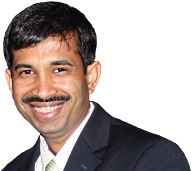Although Mahabharat has been analyzed and commented on by numerous scholars from around the world, most people from Bharat (India) would think of the TV serial Mahabharat by B.R. Chopda brought Mahabharat to the masses.
Most people’s knowledge of Mahabharat is limited by what was shown in that TV serial. However, for a curious mind, that should be the starting point to the exploration of such an epic from the ancient and glorious history of Bharat. Shrimad Bhagavad Gita, the repository of knowledge that was bestowed upon Arjun for all of us is just a part of the set of events captured within the timeline of Mahabharat.
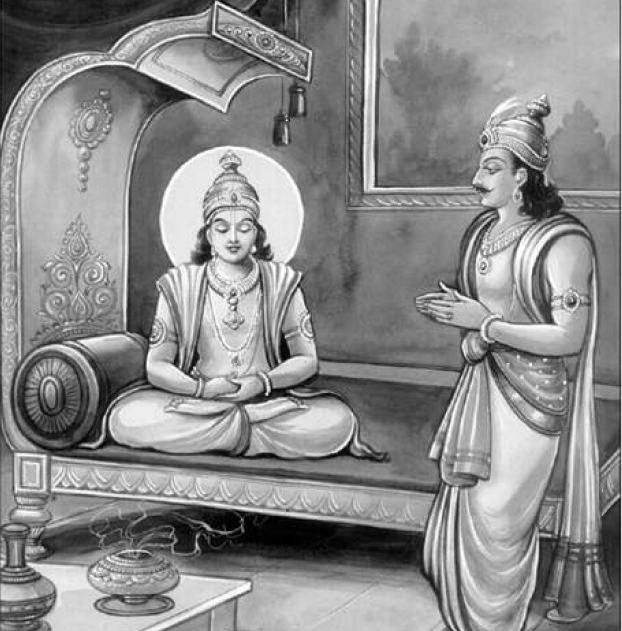
When we think about Mahabharat, people think of the battle of Kurukshetra and the set of events that lead to that battle. But Mahabharat is so much more than that. The best way to know Mahabharat is to read it and learn about the glorious history of Bharat captured in it.
To keep this post focused about Samrat Yudhishthir, I want to mention that the impression I got (and many people will agree with me) about Yudhishthir Maharaj after watching B.R. Chopda’s Mahabharat or reading about stories/commentaries by scholars was not very positive of even impressive. The impression we get is that though he always tried to follow Dharma and never lied, he was a weak/soft person whose only strength was that he had brothers like Arjun and Bheem who were mighty warriors.
But that kind of weak/unimpressive image of Samrat Yudhishthir is painted in our minds through these visuals created by TV Serials/commentators/propagandists, instead of reading the actual Mahabharat. Our knowledge is limited by commentary from people who either had an agenda and/or incentive to malign Yudhishthir’s character or did not even understand Mahabharat correctly because of their inability to understand the Sanskrit language properly.
On this matter, I want to recommend a book named Samrat Yudhishthir written by one of the very best scholars of Vedic subjects in current times, Mr. Aditya Satsangi. In that book, Aditya has pointed us to some very deep insights based on the 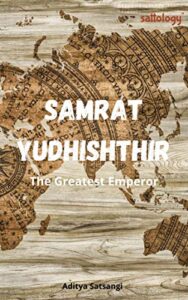 events of Mahabharat that authentically demonstrates why there has never been a king more qualified to rule the planet, more knowledgeable, or more respected by Rishis than Samrat Yudhishthir.
events of Mahabharat that authentically demonstrates why there has never been a king more qualified to rule the planet, more knowledgeable, or more respected by Rishis than Samrat Yudhishthir.
A Little About Mythology Brigade
As Mr. Satsangi correctly points out, it has been a trend to comment on Mahabharat without understanding the mood of Vyasadev, the original author of Mahabharat. When you consider him a mythological figure then everything in this world is a myth. However, every single geographical description of the Earth in Mahabharat is real. The names of landmasses, many cities, and many regions have the same names even today.
Since the author has already put it so succinctly about the mythology brigade and the ‘leftists cabal’, I would like to quote from the book as-is:
Where is all this fake news on Mahabharat originating from? From the vestiges of Romans, Greeks, Middle Eastern Historians, Christian Missionaries, Faith-based Cabals, and Islamic academicians have come some ridiculous brave attempts to make Indians not believe in Mahabharat. The mythology brigade has a newfound friend on the left that wants to undermine everything else to spread their neo ideologies. These leftists cabals have called everything else fake except themselves. They have worked closely with all faith-based colonialists (FBC) to call the history of Indians, particularly Hindus a lie or fake or mythology. In their jealous zeal to prove their fake history as truth, they have tried to call all ancient history beyond a certain timeline as fake or mythology.
Their imaginary attempts to fix the history of the world as per their myopic timelines is a wasteful expenditure of the most valuable commodity in the world known as TIME. Their futile attempts to force the viewers to match the dates of Mahabharat to far-recent Christian and Islamic timelines. Again to validate their myths they developed a concept of synchronicity that is applied especially to the timelines of Hindu or Vedic civilization to undermine the actual dates of occurrence of the events. That is done usually to prove the validity of the history of Abrahamic faiths. It is more like an organized suppression of facts through their academic networks.”
The author has done a very detailed analysis of the mythology concept and he has debunked the term with the introduction of the term Sattology which is just the opposite of mythology. Find out more at sattology.com
Now, let’s discuss some of the controversies commentators have tried to create around Samrat Yudhishthir and his character and debunk them one by one.
Did Yudhishthir Love Gambling?
Yudhishthir was the epitome of religiosity, piety, and deep knowledge of Veda. Not only was he trained to be an ideal King but nobody could excel him in Arthashastra or the comprehensive system of social & economic system for ultimate growth of the state.
The great sages such as Vyasadev, Narad, Asita, Devala, and Krishna Himself had full confidence in Yudhishthir’s ability to bring Dharm to all. All leading saintly people of his time had deep love and appreciation for Yudhishthir. His own younger brothers had deep fatherly affection for Yudhishthir. Bhim, Arjun, Nakul, and Sahadeva didn’t do anything without consulting Yudhishthir.
After Samrat Yudhishthir’s Rajsuya Yagya, when Duryodhana was jealous, this verse from Shakuni is very famous and commentators have used this as proof that Yudhishthir loved gambling:

Meaning: This son of Kunti loves to gamble but doesn’t know how to play it. If he gets invited for a gambling match then he won’t be able to back out.
But what we need to understand is, this is coming from the most crooked man who is well established as a person who couldn’t be trusted. So, why all of a sudden trust in what he said in this verse? It sounds like some commentators selectively choose to promote it because it suited the narrative they wanted to spread around Samrat Yudhishthir!
Let’s fast forward into the discussion between Samrat Yudhishthir and Vidur when Vidur was sent to invite Pandavas for the gambling match. As soon as Vidur presented the invitation for the gambling and described the preparations of the place for the match, this was the first thing Yudhishthir said:

Meaning: Gambling involves fights and severe disagreements/arguments. Which intelligent person would like to play gambling? Do you think this is the right thing to do? We will follow your advice.
And then there are a few more verses of exchange between Vidur (who is considered to an incarnation of Dharma himself) and Samrat Yudhishthir after which Yudhishthir Maharaj said this and ended the discussion:
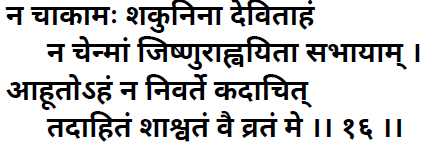
Meaning: I have no desire to play this match of gambling. If my father’s elder brother would not have invited me to play this match, I would have never played with Shakuni. But since I have been called by my father’s elder brother, I won’t back out, this is my principle.
The above verse clearly shows how distasteful was gambling for Yudhishthir Maharaja. It indicates that he accepted the invitation for this gambling match because of the orders of his father’s elder brother whom he respected as much as his own Father.
Then at the venue, before the gambling even began, there was a conversation between Shakuni and Samrat Yudhishthir where he expressed his dislike for gambling and tried to persuade him to not engage in this game of deceit.
Some of the verses that Samrat Yudhishthir said to Shakuni in that conversation are here:

Meaning: Gambling itself is a cheating trick and is the source of great sinful reactions. In this, there is no chivalry or a chance to demonstrate any heroic feat. Neither is there any ethics in gambling. Why do you praise Gambling?
…and this:

Meaning: Shakuni! Gamblers are respected in the world of deceit, gentlemen do not appreciate or praise that type of honor. Therefore, like a cruel person, do not try to win us in this deceitful way.
These are the verses he said even before the match could start. For anyone with any common sense, it’s as clear as day how much Samrat disliked gambling. But the mythologists have tried their best to paint the picture of a Gambler in him, without any trustworthy explanation.
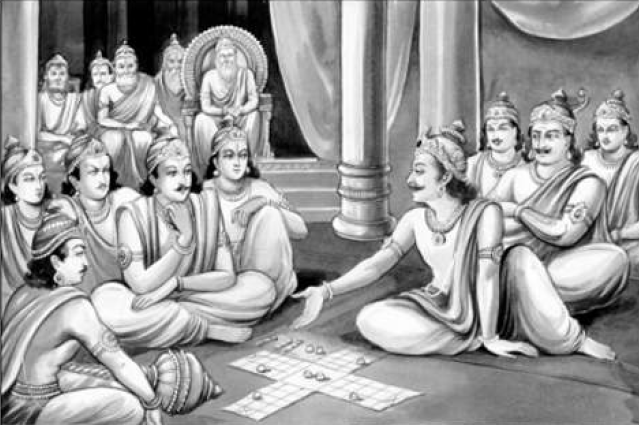
Samrat Yudhishthir never won a single round during that entire gambling match and in that moment of pressure and disappointment, it’s only human that he lost control of himself in the moment and put some of the bets that were not right for a person of his stature. But it only shows that he was still only a human who could make mistakes. That was one weak moment of his life and he fell prey to crooked people like Shakuni and Duryodhana. But it was not only Samrat Yudhishthir there, people like Dronacharya, Shukracharya, Gangaputra Bhishma, and many other kings were there but none spoke against what happened in that assembly. It was an unfortunate event that went unimaginably wrong on all counts!
But because of that one incident, the event painted Samrat Yudhishtir as a weak person. Saying that Samrat Yudhishtir was a bad king is like saying a kid is a total failure for scoring below average in one test even though he scored straight A’s throughout his life! This kind of treatment is unfair and unjust.
The nobility of character of Samrat Yudhishthir is also evident from the fact that chose to obey Dhritrashtra once more when he was asked to play the game again right after that first debacle and insult.
Samrat Yudhishthir had suffered a great setback and unimaginable pain via that first gambling match and yet he was calm and spoke respectfully to all his elders, even to Dhritrastra after all that was lost in the gambling match was returned to him after the first match.
Yudhishthir was again forcibly invited to play the second gambling match again, by Dhritrashtra. But he still did not refuse because the order of Dhritarashtra was the platform of Dharma in this case for him.
Yudhishthir always maintained high respect for Dhritarashtra. Knowing that he was going to lose everything again, he still chose to comply with his duty towards his father’s elder brother and participated. This behavior is the reason why Shri Krishna treated him like his elder brother and respected him. This is the strength of Yudhishthir’s character and why he was chosen, supported, and blessed by Shri Krishna to rule the entire planet.
The Legend of Yudhishthir’s Chariot and Aswathama Vadh
There was an event during the Battle of Mahabharat where Shri Krishna asked Yudhishthir to tell Dronacharya that Aswathama (his son) was killed even though Bhimsen had killed only an elephant with the same name. Yudhishthir complied after a little hesitation and said that Aswathama has been killed. After that Dronacharya was easily killed to secure victory for Pandavas.
The verse in Mahabharat is quoted in which Sanjay says:

Meaning: Before this, his chariot used to be borne four fingers above the ground. However, after he uttered that falsehood, his chariot started to touch the earth.
However, A lot of scholars and commentators quote this verse in agreement with Sanjay that Yudhishthir got attached to the victory so much that he was willing to go this far and lie. The logic seems solid and the fact is documented with this above verse from Mahabharat itself.
That’s the truth that his chariot touched ground from that moment. But was it because he lied? Or was it because of something else?
I beg to differ with the general opinion described above via the verse above on this matter because people who have this thought seem to ignore the fact that Shri Krishna is the supreme personality of Godhead. He is the absolute. He is the only truth and everything else exists or perishes because of His Maya.
Samart Yudhishthir knew this very well being an expansion of Dharma himself. And yet, his intelligence got clouded at that moment again and he doubted Shri Krishna for a second and hesitated thinking that Narayan is the Dharma and doubting Narayan is ‘adharma’. Even though Yudhishthr knew this fact, he still fell prey to worldly conceptions and doubted Narayan (Shri Krishna) and thus became like anyone else around him who thought that Shri Krishna asked him to lie. This deeper understanding that Shri Krishna is the absolute truth and the truth is whatever He says and nothing else can be only understood via devotion and a Vaishnava can easily understand that. This perspective of truth is beautifully explained by Radhanath Swami (one of the direct disciples of Srila Prabhupada) in the following way:
Krishna knew that if Yuddhisthir says Aswathama is dead, Drona had to believe it because Yuddhisthir was known for never lying. But Yudhishthira never lied in his whole life, so when Krishna asked him to tell a lie he was doubtful. If Krishna comes directly to tell you to tell a lie then there is a simple justification, it has to be the truth because what Krishna says is the absolute truth. Krishna is the absolute truth, therefore whatever he says must also be the truth. If Krishna says the day is night and night is day then the day is night and night is the day. But if you said, then you are a liar because you are a relative but Krisna is absolute Param Satyam Dhīmahi. We meditate on Krishna because he is the Supreme Truth. And the truth is whatever emanates from Krishna. Therefore, when Krishna told Yuddhisthir to tell this lie, he was requesting Yuddhisthir to surrender even his pride in being truthful for the sake of Krishna’s service. Now the Karma Kandis who read the Mahabharat with the idea of developing in their Artha, Karma, Dharma, and Moksa, say based on religiosity that Yuddhisthira Maharaja’s chariot fell to the ground because he lied on the order of Krishna. But the Vaisnavas have a much higher understanding of this principle. Yudhishthira Maharaj’s chariot touched the ground because he hesitated to surrender to Krishna. He hesitated in having complete faith that whatever Krishna says is the highest supreme truth.
The Dharma Raj Whose Dharma Protected Pandavas
There are numerous other incidents described in Mahabharat where the bow and arrows of the mighty Arjun, the prowess of Bheem, and other all other powers of Pandavas were not enough to save the day. Nothing could protect them but only Yudhisthir. He was able to save them all not just once but on multiple occasions when they all failed to save themselves. One such incident is that of the ‘Yaksha Pariksha’ time during Vanwaaas period where all four Pandavas were killed by the Yaksha and Yudhishthir saved them all in the end.
Similarly, in the end, after Shri Krishna left the world and Pandavas also decided to depart, there are descriptions of how Yudhishthir saved Pandava brothers and Draupadi from the painful conditions of Narak Loka. These incidents indicate that it’s wrong to see each of the Pandavas brothers alone and compare to one another and take sides. The only way to understand the spirit of Mahabharat correctly is to see Pandavas as a single unit and the glue was Yudhishthir Maharaj whom all of them respected and honored with their lives.
Therefore, to be able to appreciate the character of Samrat Yudhishthir and why he commanded the respect of all the kings, all the sages, and all his mighty brothers and why he is also known as ‘AjaatShatru’ (the one without enemies), one needs to read Mahabharat carefully. Simply reading commentaries from here and there and from authors who have little knowledge on the subject (or who are only commenting to push their agenda) only pollutes the mind of the reader.
I would like to close this by quoting the closing remarks from the book, “Samrat Yudhishthir” where the author wraps up aptly by saying this (and I fully agree):
Yudhishthir attained swarga in his own earthly human body because he always fought for dharma. He fought the huge Mahabharat war against adharmic people to fulfill the desires of Krishna. Usually, only misinformed people consider Yudhishthir weak. It is also a ploy by mythologists to show Yudhishthir weak because if they show Yudhishthir weak, then automatically Dharm is shown weak.
Your Turn To Share
Have you seem Mahahabharat TV Serial? Have you read Mahabharat? What did you think of Samrat Yudhishthir’s character before reading this post? What do you think now? Share your thoughts and add value…


